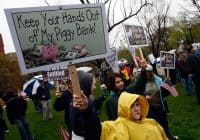
Barring a last-minute deal, the U.S. Senate looks set to allow a shutdown of the federal government to begin at midnight. What that means is that certain, nonessential functions of the government will be curtailed or stopped altogether until Congress passes a federal budget bill for the 2018 fiscal year.
Had Congress not already used its continuing resolution (CR) authority for the 2017 fiscal year to try to repeal the Affordable Care Act and its CR for 2018 fiscal year to pass the new tax bill, a simple majority of the Senate could have passed a CR to avoid a shutdown. As it is, the Senate needs a veto-proof total of 60 votes to approve the budget bill the House approved on Thursday and Senate Democrats are unified in their opposition to passing a budget bill.
The impact of a shutdown on markets is likely to be limited. There is no threat (at least not yet) this time that the United States may fail to pay interest on the national debt. When that threat is present, markets get a little out of sorts and investors can be hit pretty hard.
Before getting to what federal services will be affected by a shutdown, we want to note that there are several that will not be affected. The U.S. military, federal safety and law enforcement activities (e.g., FAA, FBI, courts), and Veterans Administration hospitals carry on although pay may be withheld. The U.S. Postal Service is not affected, and U.S. Treasury debt auctions also continue, as do Social Security payments, Medicare checks and SNAP (food stamps) distribution.
Government activities that sharply reduce or delay services or close down altogether include visitor access to national parks, monuments and museums; passport applications; mortgage approvals; government data reporting; oil and gas drilling applications; processing of small business loans; and applications for firearms permits.
If the shutdown occurs, as many as 2.8 million federal government employees could be furloughed without pay and with no guarantee that they will be paid if they were not furloughed immediately when the shutdown began. In reality, employees have been paid retroactively in all 12 government shutdowns that have occurred since 1981.
The longest shutdown occurred in between December 1995 and January 1996, when the Republican-led house and its speaker, Newt Gingrich, faced off with Democratic President Bill Clinton. That shutdown lasted 21 days. In 2013, a similar stand-off between the Republican House and President Barack Obama shut down the government for 16 days and resulted in some 850,000 government employees being furloughed.
One last note: Special Counsel Robert Mueller’s office is exempt from the shutdown and will continue its investigation unimpeded.
The Average American Is Losing Momentum On Their Savings Every Day (Sponsor)
If you’re like many Americans and keep your money ‘safe’ in a checking or savings account, think again. The average yield on a savings account is a paltry .4%1 today. Checking accounts are even worse.
But there is good news. To win qualified customers, some accounts are paying more than 7x the national average. That’s an incredible way to keep your money safe and earn more at the same time. Our top pick for high yield savings accounts includes other benefits as well. You can earn a $200 bonus and up to 7X the national average with qualifying deposits. Terms apply. Member, FDIC.
Click here to see how much more you could be earning on your savings today. It takes just a few minutes to open an account to make your money work for you.
Thank you for reading! Have some feedback for us?
Contact the 24/7 Wall St. editorial team.
 24/7 Wall St.
24/7 Wall St.

